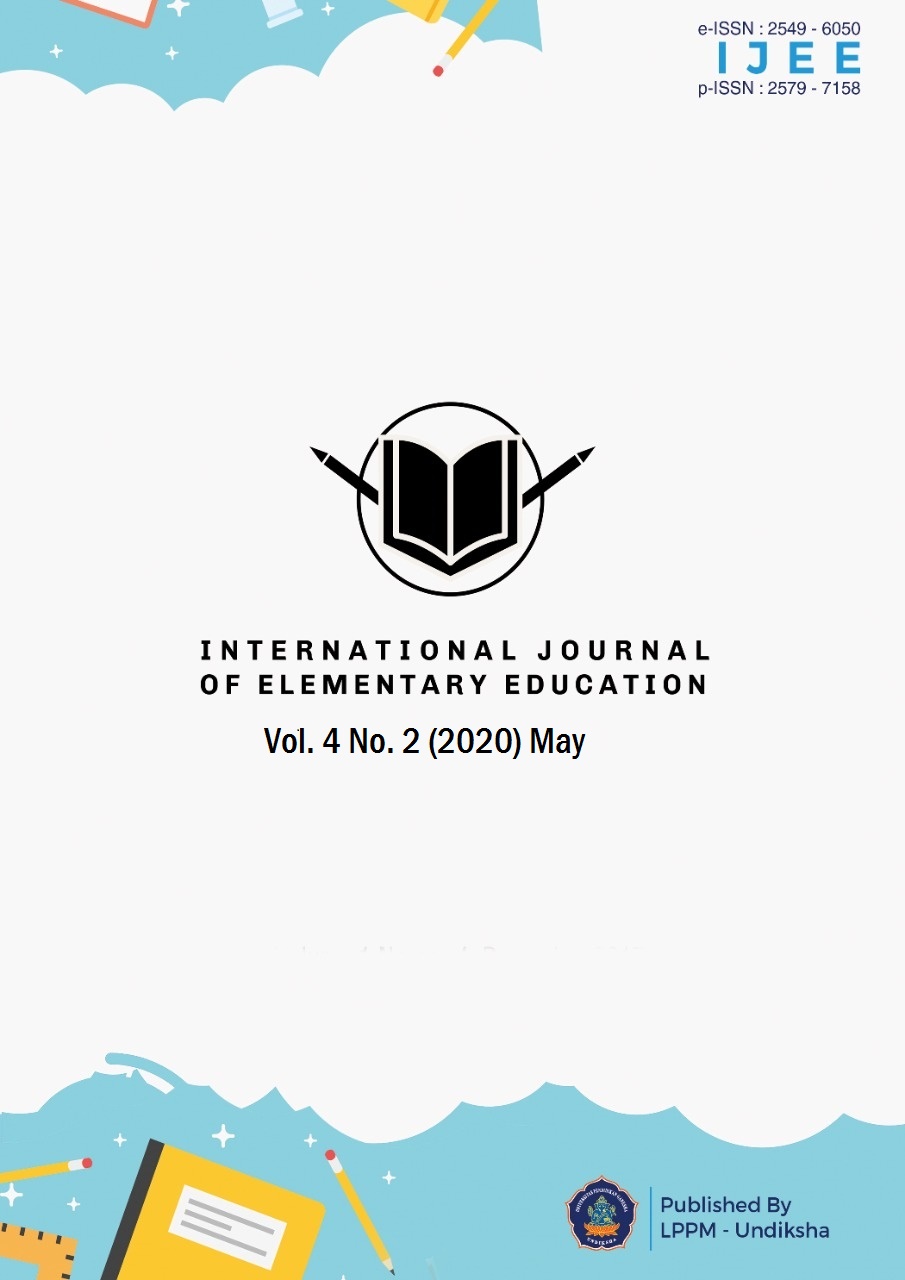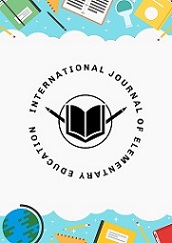Performance Evaluation of Principals of Public Elementary Schools
DOI:
https://doi.org/10.23887/ijee.v4i2.26595Kata Kunci:
evaluation, performance, public alementary schoolAbstrak
This study aimed to evaluate the performance of public-school principals in Tuntang District. The subjects of this study were the heads of SD Negeri 01 Tomplakan and SDN Tlompakan 03 using qualitative data collection techniques through interviews and observations. Data triangulation using technique triangulation and source triangulation. Triangulation of techniques through interviews, documentation studies, and observations. Triangulation of sources from the results of interviews of principals was matched with the results of interviews of supervisors, teachers, and school committees, with the same questioning instrument. The data analysis technique used is qualitative with qualitative interview data from research results at SD Negeri 01 Tomplakan out of 13 competencies, 10 competencies are able, and 3 competencies that are less capable while SDN Tlompakan 03 there are 11 capable competencies and 2 competencies that are less able. The ability of principals to the maximum is in aspects of developing school planning, developing organizations, leading schools, creating a conducive school culture, management of teachers and staff, infrastructure, community relations, managing students, curriculum and special service units, information systems, and monitoring evaluation. Conclusions from this study the headmaster has been able to carry out his managerial competence well despite having to improve his administration and use of IT in schools. Recommendations from the results of this research that are "poor" need to be improved by adding administrative staff in elementary schools and conducting training in the use of IT.
Referensi
Abbas. (2017). Penilaian kinerja kepala sekolah. Didaktika, 11(1), 12–19.
Afrita, I., Imron, A., & Arifin, I. (2018). Manajemen Hubungan Sekolah Dengan Dunia Usaha Dan Industri Dalam Meningkatkan Prestasi Belajar Peserta Didik Sekolah Menengah Vokasional. Jurnal Administrasi Dan Manajemen Pendidikan, 1(3), 313–319. https://doi.org/10.17977/um027v1i32018p313
Ahmad Bukhari Siregar, Heri Kusmanto, I. (2016). Evaluasi Kinerja Kepala Sekolah Menengah Kejuruan Se-Kabupaten Langkat Tahun 2015. Jurnal Administrasi Publik, 6(1), 13–19.
Amalia, A. (2017). Pengaruh Kecerdasan Intrapersonal Dan Interpersonal Terhadap Hasil Belajar Ips Siswa Kelas V Sd/Mi Se-Sarwas 1 Kecamatan Petarukan Kabupaten Pemalang.
Caganaga, Ç. K., & Behlul, M. (2018). Teacher Views of Headmasters Regarding to Fulfilling Management Functions of Human Resources. J Sci, 2(1).
Djafar, H., & Nurhafizah N, N. N. (2018). Pengaruh Motivasi Kepala Sekolah Terhadap Kinerja Guru Dan Pegawai Di Smk Muhammadiyah 3 Makassar. Idaarah: Jurnal Manajemen Pendidikan, 2(1), 24–36. https://doi.org/10.24252/idaarah.v2i1.5064
Gil-Flores, J., Rodríguez-Santero, J., & Torres-Gordillo, J. J. (2017). Factors that explain the use of ICT in secondary-education classrooms: The role of teacher characteristics and school infrastructure. Computers in Human Behavior, 68, 441–449. https://doi.org/10.1016/j.chb.2016.11.057
Jannati, G., & Omidian, F. (2015). The Evaluation of the Performance of Primary and Secondary School Managers Using the EFQM Model: A Case from Iran. International Letters of Social and Humanistic Sciences, 48, 138–147. https://doi.org/10.18052/www.scipress.com/ilshs.48.138
Khan, M. A., & Mattoo, M. I. (2016). School of Education and Behavioural Sciences. INSIGHT, 21(1).
Liskayani, Muhammad Kristiawan2, T. (2019). Evaluation of the Performance of Heads of Public Elementary Schools in Air Kumbang District Based on Workloads in Accordance With Government. JPDN, 5(1), 65–84. https://doi.org/erja Kepala SD... https://doi.org/10.29407/jpdn.v4i2. 13261
Miklaei. M. (2010). The evaluation of the performance of Ministry of Education of Mazandaran based on EFQM. Journal of Management, 9(spesial).
Muzakar, M. (2014). Kinerja Kepala Sekolah Dalam Meningkatkan Mutu Lulusan Pada Madrasah Tsanawiyah Negeri Meureubo. Jurnal Ilmiah Islam Futura, 14(1), 110. https://doi.org/10.22373/jiif.v14i1.83
Novi Hardini Putri, U. B. W. (2018). PENGARUH KINERJA KEPALA SEKOLAH TERHADAP KEBERHASILAN MANAJEMEN BERBASIS SEKOLAH MELALUI PARTISIPASI MASYARAKAT DI SMP. Jurnal Akuntabilitas Manajemen Pendidikan, 6(1), 1689–1699. https://doi.org/https://doi.org/10.21831/amp.v6i1.9810
Permadi, K. (2010). Pemimpin dan Kepemimpinan dalam Manajemen. Rineka Cipta.
Pratama, T., Kususma, P., Saraswati, N. M., Studi, P., Informasi, S., Studi, P., Informatika, T., & Keputusan, S. P. (2018). Penilaian Kinerja Kepala Sekolah / Madrasah Sma / Smk Di Kecamatan Bumiayu Menggunakan. 11(1), 120–134.
Siregar, S. (2018). Signifikansi Kepemimpinan Kepala Sekolah Dalam Pengelolaan Sekolah Berbasis Manajemen Sekolah.
Taswir. (2014). Manajerial Kepala Sekolah dalam meningkatkan Kinerja Guru pada Sekolah Menengah Kejuruan (SMK) Negeri 2 Sinabang Kabupaten Semeuleu. Jurnal Ilmiah Didaktika.
Wirawan. (2012). Evaluasi: teori. Model, stadar, Aplikasi dan Profesi. Rajawali Pers.
Yetri, Y. (2015). Evaluasi Kinerja Kepala Sekolah Menengah Kejuruan Negeri Di Kota Bandar Lampung. Lentera Pendidikan : Jurnal Ilmu Tarbiyah Dan Keguruan, 18(1), 95–106. https://doi.org/10.24252/lp.2015v18n1a8
Yogaswara, A. (2010). Kontribusi Manajerial Kepala Sekolah dan Sistem Informasi Kepegawaian Terhadap kinerja Mengajar Guru. Jurnal Penelitian Pendidikan.
Unduhan
Diterbitkan
Cara Mengutip
Terbitan
Bagian
Lisensi
Authors who publish with the International Journal of Elementary Education agree to the following terms:
- Authors retain copyright and grant the journal the right of first publication with the work simultaneously licensed under a Creative Commons Attribution License (CC BY-SA 4.0) that allows others to share the work with an acknowledgment of the work's authorship and initial publication in this journal.
- Authors are able to enter into separate, additional contractual arrangements for the non-exclusive distribution of the journal's published version of the work (e.g., post it to an institutional repository or publish it in a book), with an acknowledgment of its initial publication in this journal.
- Authors are permitted and encouraged to post their work online (e.g., in institutional repositories or on their website) prior to and during the submission process, as it can lead to productive exchanges, as well as earlier and greater citation of published work. (See The Effect of Open Access)










